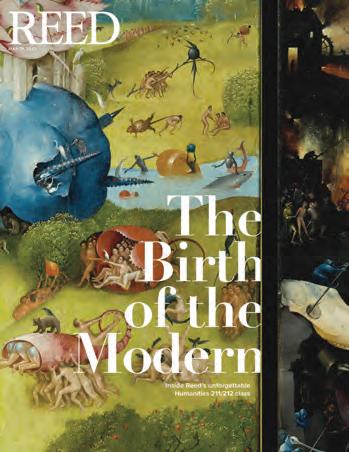
4 minute read
Mailbox
Write to us! We love getting mail from readers. Letters should be about Reed (and its alumni) or Reed Magazine (and its contents) and run no more than 300 words; subsequent replies may run only half the length of their predecessors. Our decision to print a letter does not imply any endorsement. Letters are subject to editing. (Beware the editor’s hatchet.) For contact information, look to your left.
Kudos to Lydgate
Chris Lydgate ’90 has rocket-powered Reed Magazine in transformative ways. Damned fine job. Shame to lose him but looks like the crew is ready to take the enterprise forward boldly. Steve Lindsay ’81
Humane Letters
I very much enjoyed the descriptions of Hum 211/212 and wish I could have taken such a course. The section on cultural encounters by Prof. Dana Katz [art history] and Prof. Michael Breen [history] on those between Native Americans and Europeans did not mention, perhaps for lack of space, the important, but not generally known, influence of indigenous social arrangements on the development of notions of equality and liberty by the philosophes. The free lifestyle and relative egalitarianism of Algonkian speakers, introduced to the French philosophes by the widely disseminated writings of French missionaries to Canada, such as Brother Gabriel Sagard, had a major influence on the developments of concepts of liberty. Locke and Voltaire credited his accounts in their writings, and Native American views/ criticisms of European culture were advanced in novels and plays, especially in France. This important Native American contribution to European thought is well developed in Graeber and Wengrow’s The Dawn of Everything: A New history of Humanity.
Bob Erickson ’60 Tucson, Arizona
My experience in the Humanities One course was the best example of the small-size-conference method of teaching. Our wonderful teacher, Dorothy Johansen ’33 [history 1934–84], called us all her little cabbages: empty heads to be filled. I turned in my first paper in her freshman Humanities One class after reading The Peloponnesian War by Thucydides. I reread the book carefully and prepared a lengthy paper detailing all the information I found leading up to the war.
The note on my returned paper was: “I asked for the factors leading to the war, not the facts.”
It was then that I became a Reed student. (My roommate and remaining good friend, Harry Jacob ’54, recalls the comment on the paper I shared with him.)
Before completing my 120-page thesis on the federal government’s cost benefit analysis of hydroelectric projects, I tossed it away and went to Alaska for the summer.
Fifty years later I returned to Reed part time to write a new thesis; this was “Principal Agent Theory: Case Study of the Presidio Trust.” The Presidio Trust was an agency newly created to manage the national park following the departure of the US Army from the former army base in San Francisco, where I grew up. Writing this was a fun and rewarding effort. I learned that persistent effort by combined groups can effect change. Two years later, with the Sierra Club, the Presidio Historical Society, and neighborhood groups, I helped overcome the resistance of the Presidio Trust to tearing down two nonhistoric wings of an anchor-shaped building built in the 1930s to house merchant marines. The Merchant Marine building stands today as one of the entrances to the national park.
My thesis was accepted, and I graduated in 2005, Phi Beta Kappa!
Reed Magazine, March 2022
Don Green ’54/’04 San Rafael, California
Lingering Questions
Thanks are due, I suppose, to the departing Chris Lydgate ‘90 for his attempt to “explain” the Reed endowment, which evidently works, and matters, pretty much like any other endowment. However, he failed to address the critical issue of Reed’s investment criteria, and whether the goal of earning 8% is more important than using Reed’s $700 million to advance the social, environmental, and equity principles promoted in the rest of the magazine.
Claire Gorfinkel ’66 Altadena, California
Remembering Mike Munk
Mike Munk ’56 was the self-appointed political conscience of Reed for all of the years that I knew him, starting in 1955, when I was a freshman and he was a few years ahead of me. It was from him that I first heard of Professor Stanley Moore’s [philosophy 1948–54] dismissal (with loss of tenure—for which Reed was censured by professional organizations) and what Mike viewed as the college’s abject surrender to one of the red-baiting congressional committees that set the stage for Senator Joe McCarthy’s later (and subsequently better-remembered) assault on what is now called “Our Democracy.”
I recall that I met Mike for the first time at the annual celebration of the 1905 Russian Revolution, held that year on a student houseboat moored in Sellwood, where my cousin by marriage (too complicated to explain!), Jonathan Ezekiel, and his girlfriend, Karen Kals Ezekiel ’56, also lived on a houseboat. Fragments of songs that I heard for the first time at that party lodged permanently in my mind: “When I went shootin’ with Rasputin in the palace of the Czars,” and “Enter the palace, kill the czarina,” etc.…
Mike and I maintained a casual friendship over the years at Reed, and later in New York, where we came across one another repeatedly. I also followed with interest and admiration Mike’s dogged persistence regarding the Stanley Moore case over the decades, as well as his support for many other just causes.
From almost my first day at Reed, I’ve been hearing laments about the extinction of its last, great generation of outspoken, radical thinkers and actors. Now, with Mike Munk’s passing, I suppose I could join that chorus, but I’m not inclined to do so.
William Bernhardt ’60 Staten Island, New York







